Related Research Articles

The Tragedy of Hamlet, Prince of Denmark, often shortened to Hamlet, is a tragedy written by William Shakespeare sometime between 1599 and 1601. It is Shakespeare's longest play, with 29,551 words. Set in Denmark, the play depicts Prince Hamlet and his revenge against his uncle, Claudius, who has murdered Hamlet's father in order to seize his throne and marry Hamlet's mother.
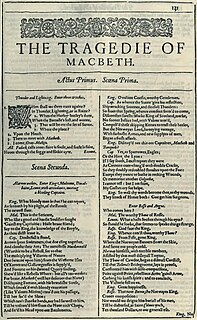
Macbeth is a tragedy by William Shakespeare. It is thought to have been first performed in 1606. It dramatises the damaging physical and psychological effects of political ambition on those who seek power. Of all the plays that Shakespeare wrote during the reign of James I, Macbeth most clearly reflects his relationship with King James, patron of Shakespeare's acting company. It was first published in the Folio of 1623, possibly from a prompt book, and is Shakespeare's shortest tragedy.

Othello is a tragedy written by William Shakespeare, probably in 1603, set in the contemporary Ottoman–Venetian War (1570–1573) fought for the control of the Island of Cyprus, since 1489 a possession of the Venetian Republic. The port city of Famagusta finally fell to the Ottomans in 1571 after a protracted siege. The story revolves around two characters, Othello and Iago. Othello is a Moorish military commander who was serving as a general of the Venetian army in defence of Cyprus against invasion by Ottoman Turks. He has recently married Desdemona, a beautiful and wealthy Venetian lady much younger than himself, against the wishes of her father. Iago is Othello's malevolent ensign, who maliciously stokes his master's jealousy until the usually stoic Moor kills his beloved wife in a fit of blind rage. Due to its enduring themes of passion, jealousy and race, Othello is still topical and popular and is widely performed, with numerous adaptations.
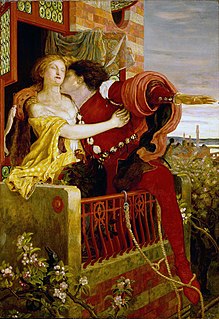
Romeo and Juliet is a tragedy written by William Shakespeare early in his career about two young Italian star-crossed lovers whose deaths ultimately reconcile their feuding families. It was among Shakespeare's most popular plays during his lifetime and, along with Hamlet, is one of his most frequently performed plays. Today, the title characters are regarded as archetypal young lovers.

William Shakespeare was an English playwright, poet and actor. He is widely regarded as the greatest writer in the English language and the world's greatest dramatist. He is often called England's national poet and the "Bard of Avon". His extant works, including collaborations, consist of some 39 plays, 154 sonnets, three long narrative poems, and a few other verses, some of uncertain authorship. His plays have been translated into every major living language and are performed more often than those of any other playwright. His works continue to be studied and reinterpreted.

The Merchant of Venice is a 16th-century play written by William Shakespeare in which a merchant in Venice named Antonio defaults on a large loan provided by a Jewish moneylender, Shylock. It is believed to have been written between 1596 and 1599.

Shakespearean tragedy is the designation given to most tragedies written by playwright William Shakespeare. Many of his history plays share the qualifiers of a Shakespearean tragedy, but because they are based on real figures throughout the history of England, they were classified as "histories" in the First Folio. The Roman tragedies—Julius Caesar, Antony and Cleopatra and Coriolanus—are also based on historical figures, but because their sources were foreign and ancient they are almost always classified as tragedies rather than histories. Shakespeare's romances were written late in his career and published originally as either tragedy or comedy. They share some elements of tragedy, insofar as they feature a high-status central character, but they end happily like Shakespearean comedies. Almost three centuries after Shakespeare's death, the scholar F. S. Boas also coined a fifth category, the "problem play," for plays that do not fit neatly into a single classification because of their subject matter, setting, or ending. The classifications of certain Shakespeare plays are still debated among scholars.

King Lear is a tragedy written by William Shakespeare. It is based on the mythological Leir of Britain. King Lear relinquishes his power and land to two of his daughters. He becomes destitute and insane and a proscribed crux of political machinations. The first known performance of any version of Shakespeare's play was on St. Stephen's Day in 1606. The three extant publications from which modern editors derive their texts are the 1608 quarto (Q1) and the 1619 quarto and the 1623 First Folio. The quarto versions differ significantly from the folio version.
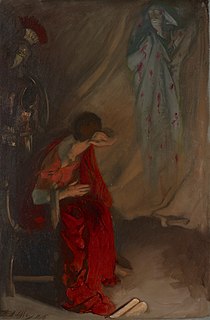
The Tragedy of Julius Caesar (First Folio title: The Tragedie of Ivlivs Cæsar) is a history play and tragedy by William Shakespeare first performed in 1599. Although the play is named Julius Caesar, Brutus speaks more than four times as many lines as the title character, and the central psychological drama of the play focuses on Brutus.

Shakespeare in Love is a 1998 romantic period comedy-drama film directed by John Madden, written by Marc Norman and playwright Tom Stoppard, and produced by Harvey Weinstein. It stars Gwyneth Paltrow, Joseph Fiennes, Geoffrey Rush, Colin Firth, Ben Affleck and Judi Dench.

Sir David Courtney Suchet, is an English actor known for his work on British stage and television. He portrayed Edward Teller in the television serial Oppenheimer (1980) and received the RTS and BPG awards for his performance as Augustus Melmotte in the British serial The Way We Live Now (2001). International acclaim and recognition followed his performance as Agatha Christie's detective Hercule Poirot in Agatha Christie's Poirot (1989–2013), for which he received a 1991 British Academy of Film and Television Arts (BAFTA) nomination.
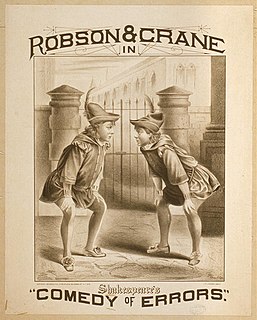
The Comedy of Errors is one of William Shakespeare's early plays. It is his shortest and one of his most farcical comedies, with a major part of the humour coming from slapstick and mistaken identity, in addition to puns and word play. The Comedy of Errors is, along with The Tempest, one of only two Shakespeare plays to observe the Aristotelian principle of unity of time—that is, that the events of a play should occur over 24 hours. It has been adapted for opera, stage, screen and musical theatre numerous times worldwide. In the centuries following its premiere, the play's title has entered the popular English lexicon as an idiom for "an event or series of events made ridiculous by the number of errors that were made throughout".

Twelfth Night, or What You Will is a romantic comedy by William Shakespeare, believed to have been written around 1601–1602 as a Twelfth Night's entertainment for the close of the Christmas season. The play centres on the twins Viola and Sebastian, who are separated in a shipwreck. Viola falls in love with the Duke Orsino, who in turn is in love with Countess Olivia. Upon meeting Viola, Countess Olivia falls in love with her thinking she is a man.

Anne Hathaway was the wife of William Shakespeare, the English poet, playwright and actor. They were married in 1582, when Hathaway was 26 years old and Shakespeare was 18. She outlived her husband by seven years. Very little is known about her life beyond a few references in legal documents. Her personality and relationship to Shakespeare have been the subject of much speculation by many historians and writers.
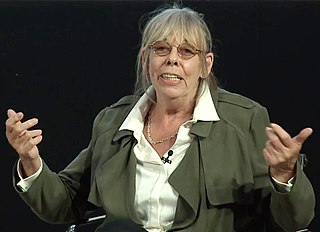
Frances de la Tour, also Frances J. de Lautour, is an English actress, known for her role as Miss Ruth Jones in the television sitcom Rising Damp from 1974 until 1978. She is a Tony Award winner and three-time Olivier Award winner.

Shakespeare's Globe is a reconstruction of the Globe Theatre, an Elizabethan playhouse for which William Shakespeare wrote his plays, in the London Borough of Southwark, on the south bank of the River Thames. The original theatre was built in 1599, destroyed by the fire in 1613, rebuilt in 1614, and then demolished in 1644. The modern Globe Theatre is an academic approximation based on available evidence of the 1599 and 1614 buildings. It is considered quite realistic, though modern safety requirements mean that it accommodates only 1,400 spectators compared to the original theatre's 3,000.

Sir David Mark Rylance Waters is an English actor, playwright, and theatre director. He was the first artistic director of Shakespeare's Globe in London, between 1995 and 2005. After training at the Royal Academy of Dramatic Art in London, Rylance made his professional debut at the Citizens Theatre, Glasgow in 1980. He appeared in the West End productions of Much Ado About Nothing in 1994 and Jerusalem in 2010, winning the Olivier Award for Best Actor for both. He has also appeared on Broadway, winning three Tony Awards: two for Best Actor for Boeing Boeing in 2008 and Jerusalem in 2011, and one for Best Featured Actor for Twelfth Night in 2014. He received Best Actor nominations for Richard III in 2014 and Farinelli and the King in 2017. He is one of only eight actors to have twice won the Tony Award for Best Actor in a Play, while his nominations for Richard III and Twelfth Night in 2014 make him one of only six performers to be nominated in two acting categories in the same year.

Shakespeare's plays are a canon of approximately 39 dramatic works written by English poet, playwright, and actor William Shakespeare. The exact number of plays—as well as their classifications as tragedy, history, or comedy—is a matter of scholarly debate. Shakespeare's plays are widely regarded as being among the greatest in the English language and are continually performed around the world. The plays have been translated into every major living language.

The Shakespeare Tavern is an Elizabethan playhouse located in downtown Atlanta, Georgia, United States. Starting productions at Manuel's Tavern in Atlanta in 1984, the Tavern moved to 499 Peachtree Street in 1990.

Shakespeare's influence extends from theater and literatures to present-day movies, Western philosophy, and the English language itself. William Shakespeare is widely regarded as the greatest writer in the history of the English language, and the world's pre-eminent dramatist. He transformed European theatre by expanding expectations about what could be accomplished through innovation in characterization, plot, language and genre. Shakespeare's writings have also impacted many notable novelists and poets over the years, including Herman Melville, Charles Dickens, and Maya Angelou, and continue to influence new authors even today. Shakespeare is the most quoted writer in the history of the English-speaking world after the various writers of the Bible; many of his quotations and neologisms have passed into everyday usage in English and other languages. According to Guinness Book of World Records Shakespeare remains the world’s best-selling playwright, with sales of his plays and poetry believed to have achieved in excess of four billion copies in the almost 400 years since his death. He is also the third most translated author in history.
